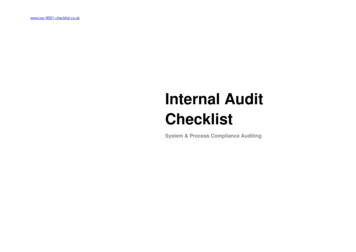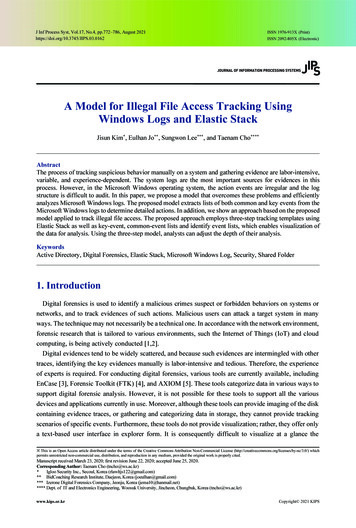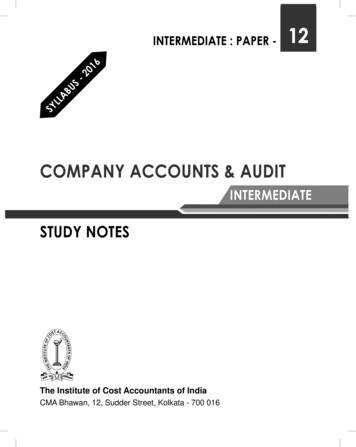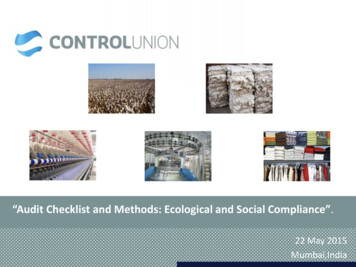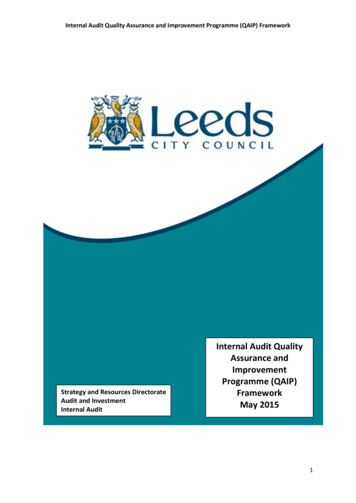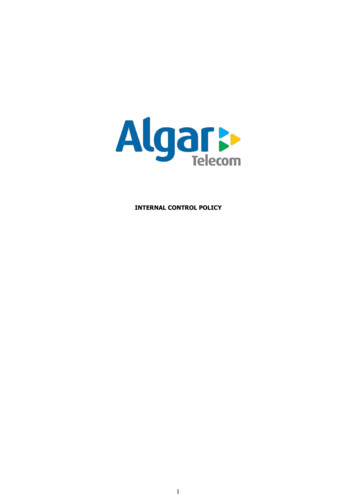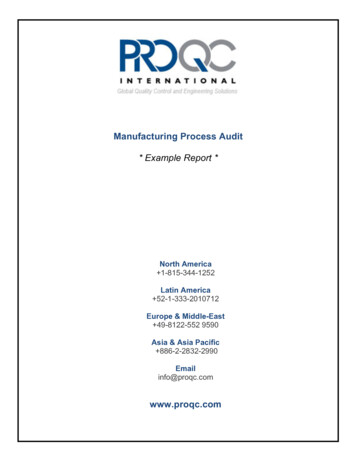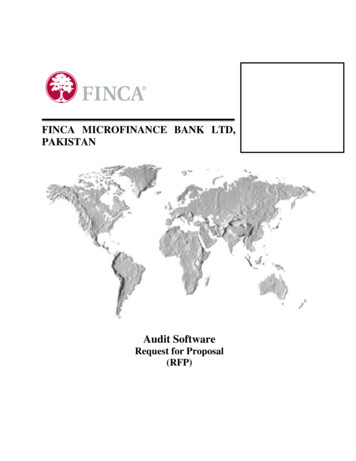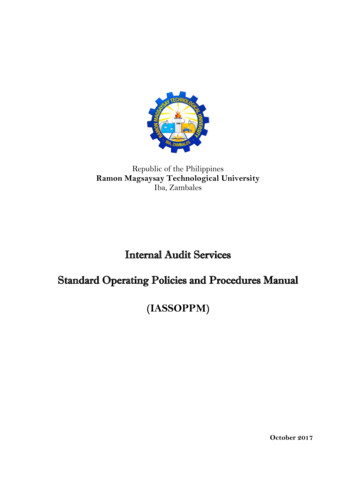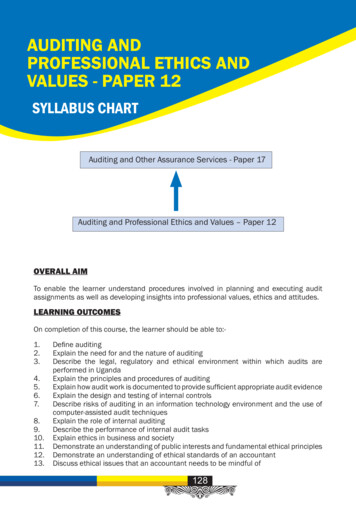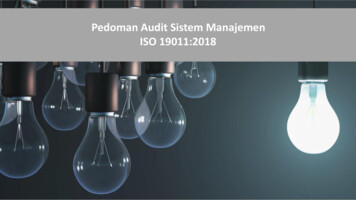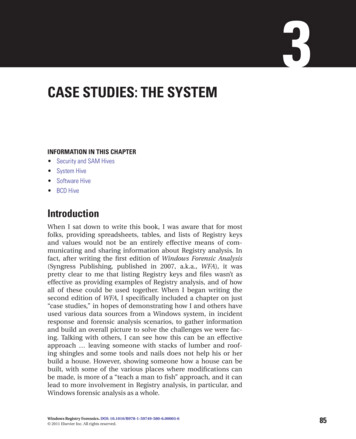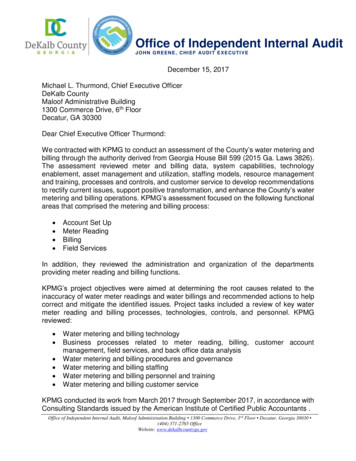
Transcription
Office of Independent Internal AuditJOHN GREENE, CHIEF AUDIT EXECUTIVEDecember 15, 2017Michael L. Thurmond, Chief Executive OfficerDeKalb CountyMaloof Administrative Building1300 Commerce Drive, 6th FloorDecatur, GA 30300Dear Chief Executive Officer Thurmond:We contracted with KPMG to conduct an assessment of the County’s water metering andbilling through the authority derived from Georgia House Bill 599 (2015 Ga. Laws 3826).The assessment reviewed meter and billing data, system capabilities, technologyenablement, asset management and utilization, staffing models, resource managementand training, processes and controls, and customer service to develop recommendationsto rectify current issues, support positive transformation, and enhance the County’s watermetering and billing operations. KPMG’s assessment focused on the following functionalareas that comprised the metering and billing process: Account Set UpMeter ReadingBillingField ServicesIn addition, they reviewed the administration and organization of the departmentsproviding meter reading and billing functions.KPMG’s project objectives were aimed at determining the root causes related to theinaccuracy of water meter readings and water billings and recommended actions to helpcorrect and mitigate the identified issues. Project tasks included a review of key watermeter reading and billing processes, technologies, controls, and personnel. KPMGreviewed: Water metering and billing technologyBusiness processes related to meter reading, billing, customer accountmanagement, field services, and back office data analysisWater metering and billing procedures and governanceWater metering and billing staffingWater metering and billing personnel and trainingWater metering and billing customer serviceKPMG conducted its work from March 2017 through September 2017, in accordance withConsulting Standards issued by the American Institute of Certified Public Accountants .Office of Independent Internal Audit, Maloof Administration Building 1300 Commerce Drive, 3rd Floor Decatur, Georgia 30030 (404) 371-2765 OfficeWebsite: www.dekalbcountyga.gov
(AICPA). These standards are appropriate for CPA firms that develop findings,conclusions, and recommendations based on a scope of work determined by the client,in this case, the Office of Independent Internal Audit and Audit Oversight Committee,which is independent of the County water metering and billing. Similar to GovernmentAuditing Standards, the AICPA Standards for Consulting Services require practitioners toundertake only professional services for which they are competent; exercise dueprofessional care in conducting the work; adequately plan and supervise the work; andobtain sufficient, relevant data to provide a reasonable basis for conclusions andrecommendations.The KPMG report should be read in its entirety to understand the details for each of the22 issues, corresponding 22 recommendations, and strategic next steps. The issues andrecommendations are summarized in Appendix 2 of the report on page 113 where KPMGhas prioritized the 22 recommendations based on impact to improving operations.Based on fieldwork, observations and recommendations, KPMG identified complexchallenges with DeKalb County’s water metering and billing operations. They identifiednumerous observations and recommendations in this report for rectifying historic andcurrent meter reading and billing issues. There are numerous issues, as opposed to asingle event, that contributed to the abnormally high volume of inaccurate water bills.Below is a succinct summary of contributing issues causing inaccurate water meteringand billing: Governance, management, organizational reporting, and operations arebifurcated between two departments - the Department of WatershedManagement and the Finance Department’s Utility Customer OperationsDivision. The two functions reside in differing departments reporting to differingdepartment directors which does not allow for a single person to beaccountable and manage end-to-end water metering and billing processesMany business processes are manual and use hardcopy forms (as opposed toelectronic) which results in mistakes by human errorMany business processes are inefficient and ineffective causing rework anddelaysThere are multiple disparate (not integrated) technology systems supportingvarious functions of operations causing duplicative data entry and lack of aconsolidated view of work order status in a single systemKey operations such as meter installation is reliant on a third party contractorwhich without strong vendor management protocols limits the County’s controlover the process and personnel performing the processThere is heavy use of temporary employees, as opposed to full time employeeswithin operations. Temporary employees are prone to higher turnover ratescausing less consistency in service delivery and knowledge retentionA significant portion of current water meters are aged resulting in an increasedneed for manual readings (more prone to human error)Meter read routes are not optimized or workload balanced across meterreaders resulting in certain routes having less budgeted time per meter tiple
operational/exception reports that are not being utilizedThere are multiple types of water meters with different methods for reading andrecording meter dataThere is limited documentation/desktop procedures for estimating, correctingor releasing billsBelow are the key recommendations: Merge the two bifurcated water metering and billing functions into a singleorganizational unit governed by a single department director that can overseeand manage end-to-end water metering and billing processes for the County.Create new supervisory unit with increased input into overall DWM strategyand improvement efforts, including meter reading and field services teamsresponding to routine UCO requestsDevelop quality control objectives for critical billing data inputsReplace manually read and other older meters based on their ageConsolidate and strengthen management and controls between UCO andDWM billing functionsPrepare standard procedures for releasing bills “as is” and estimating andcalculating revised billsEstablish quality control objectives and data requirements for Field Servicesprocesses based on customer and billing needs to avoid rework/duplicaterequestsRevise business processes to optimize capabilities and use of CityworkssystemDevelop and provide Meter Readers with quick reference card for manualmeter readsLeverage existing AutoRead System Reports to control errors and omissionsprior to CPAK uploadImplement a program to promote high performing temporary staff to full-timepositionsEvaluate alternative interface designs for AutoRead, Cityworks, andwarehouse/inventory systems to enable effective data exchangeEnsure equipment is in serviceable condition before being deployed to the fieldand develop a program with parameters regarding replacing equipment that isnearing the end of its useful lifeDWM and UCO should prioritize filling vacancies with personnel who possessthe necessary skill sets and ensure incoming staff are receiving adequateknowledge of daily roles and responsibilitiesImprove the detail and flexibility of exception reporting to meet the needs ofmultiple purposes and users (Billing Specialists)Develop robust vendor management protocols within their contract terms,conditions and contract management processesExpand Advanced Metering Infrastructure (AMI)/Automated Meter Reading(AMR) technology capability system-wide to eliminate time-intensive manualprocesses and reduce meter reading errors
Harold Smith, Audit Oversight CommitteeGena Major, Audit Oversight CommitteeHarmel Codi, Audit Oversight CommitteeStacey Kalberman, Ethics Officer, DeKalb Board of Ethics
DeKalb CountyWater MeteringAnd Bil ingAudit ReportSeptember 26, 2017kpmg.com
Contents1.Executive summary . 22.Introduction . 53.Background . 74.Administration and Organization . 155.Account Set Up . 256.Meter Reading . 407.Billing . 598.Field Services . 929.Looking Forward . 104Appendix 1: Glossary . 111Appendix 2: Summary of Issues and Recommendations . 113
1. Executive summaryAs a result of both internal and external factors discussed throughout this report, DeKalb Countyencountered a series of organizational, operational and technical issues over the past years, limiting itsability to consistently provide effective and efficient meter reading, meter billing, field services, andcustomer service. Outputs from the County’s water metering and billing operations resulted in anincrease in meter reading inaccuracies, estimated and inaccurate customer bills, and delays inperforming routine field service activities.In January 2017, new DeKalb County Chief Executive Officer Michael Thurmond was sworn into officeand began efforts to identify and resolve issues related to inaccurate water bills. The County Executivehas named the project “New Day” – with the objective of providing a plan for addressing the waterbilling crisis. KPMG did not evaluate or assess the New Day project. KPMG is encouraged by theformal initiative being led by the CEO to correct the current environment and the County’s support toconduct this assessment.This report provides a “deep-dive” analysis into factors contributing to the County’s current state,identifying root causes and next steps to enable the County to enhance its water metering and billingoperations.Scope and ApproachThe DeKalb County Office of Independent Internal Audit and the Audit Oversight Committee engagedKPMG to conduct an assessment of County water metering and billing through the authority it derivesfrom Georgia House Bill 599 (HB 599). HB 599 notes that the Office of Internal Audit shall becompletely independent and shall not be subject to the control or supervision by the Chief Executive,the Commission, or any other official, employee, department or agency of the County government.The assessment reviewed meter and billing data, system capabilities, technology enablement, assetmanagement and utilization, staffing models, resource management and training, processes andcontrols, and customer service to develop recommendations to rectify current issues, support positivetransformation, and enhance the County’s water metering and billing operation. The assessment wasconducted under the American Institute of Certified Public Accountants (“AICPA”) Standards forConsulting Services.KPMG’s project objectives were aimed at determining the root causes related to the inaccuracy ofwater meter readings and water billings and to recommend actions to help correct and mitigate theidentified issues. Project tasks included review of key water meter reading and billing processes,technologies, controls, and people. KPMG reviewed:— Water metering and billing technology— Business processes related to meter reading, billing, customer account management, fieldservices, and back office data analysis— Water metering and billing procedures and governance— Water metering and billing staffing— Water metering and billing personnel and training— Water metering and billing customer serviceKPMG developed a phased project approach to accomplish project objectives. KPMG’s projectapproach included the following three phases:
DeKalb County Water Metering and Billing Audit Report— Phase 1: Project planning and kickoff – In Phase 1, KPMG met with key project stakeholders toreaffirm project goals, milestones and objectives.— Phase 2: Information gathering and analysis – In Phase 2, KPMG gathered information tounderstand the County’s water metering and billing operation. Phase 2 activities included: Assessing current state of operations, technology, processes, procedures, andorganization Conducting interviews with more than 50 County staff and third party vendors Conducting one field site tour Conducting ride-along observations with meter reading and field services personnel Analyzing current state documentation Reviewing industry and functional benchmarks Analyzing metering and billing data, both current and historic Reviewing daily water metering and billing operations Assess operational metrics and processes Evaluating use and effectiveness of technology Evaluating use and quality of water metering and billing data— Phase 3: Reporting and Validation – In Phase 3, KPMG developed this report to summarize ourproject approach, root causes and observations, and recommendations for future state to supportthe further enhancement of the County’s water metering and billing operation.Contributing FactorsAging infrastructure, manual processes, limited use of technology, and lack of proactive staffdevelopment has limited the County’s ability to accurately bill residents for water consumption. TheCounty’s inability to clearly articulate and resolve root causes of past billing inaccuracies hasexacerbated the problem over the past 2 years. The County is in the process of trying to regain thetrust of citizens and rectify past water metering and billing failings.Based on fieldwork, observations and recommendations, we have identified complex challenges withDeKalb County’s water metering and billing operations. KPMG has identified numerous observationsand recommendations in this report for rectifying historic and current meter reading and billing issues.There are numerous issues, as opposed to a single event, that contributed to the abnormally highvolume of inaccurate water bills. Below is a succinct summary of contributing issues causinginaccurate water metering and billing:— Governance, management, organizational reporting, and operations are bifurcated between twodepartments -- the Department of Watershed Management and the Finance Department’s UtilityCustomer Operations Division. The two functions reside in differing departments reporting todiffering department directors which does not allow for a single person to be accountable andmanage end-to-end water metering and billing processes— Many business processes are manual and use hardcopy forms (as opposed to electronic) whichresults in mistakes by human error— Many business processes are inefficient and ineffective causing rework and delays— There are multiple disparate (not integrated) technology systems supporting various functions ofoperations causing duplicative data entry and lack of a consolidated view of work order status in asingle system3
DeKalb County Water Metering and Billing Audit Report— Key operations such as meter installation is reliant on a third party contractor which without strongvendor management protocols limits the County’s control over the process and personnelperforming the process— There is heavy use of temporary employees, as opposed to full time employees within operations.Temporary employees are prone to higher turnover rates causing less consistency in servicedelivery and knowledge retention— A significant portion of current water meters are aged resulting in an increased need for manualreadings (more prone to human error)— Meter read routes are not optimized or workload balanced across meter readers resulting in certainroutes having less budgeted time per meter read— Existing technology has the capability to produce multiple operational/exception reports that arenot being utilized— There are multiple types of water meters with different methods for reading and recording meterdata— There is limited documentation/desktop procedures for estimating, correcting or releasing billsThis report should be read in its entirety to understand the details for each of the 22 issues,corresponding 22 recommendations, and strategic next steps contained in this report.Next StepsThe County should review, consider, and implement numerous recommendations contained in thisreport and other potential recommendations identified from the New Day Project to begin to correctthe meter reading and billing issues. As the County’s path to success is dependent on successfullyimplementing a multitude of recommendations spanning operations, organization structure,technology, personnel, vendor management, and communication; the County must have a formal andtransparent method to effectively implement recommendations and positive change that is sustainable,meaningful, and impactful.The County should establish a formal transformation program aimed at implementing numerousrecommendations to rectify historical and current water meter reading and billing issues. Any suchprogram should have formal methods for promoting accountability and transparency. Periodic statusreports including progress to-date and key performance measures should be published and presentedto governing bodies and the public. Section 9 describes in detail the suggested governance andimplementation framework needed to successfully transform the County’s water metering and billingoperations.4
DeKalb County Water Metering and Billing Audit Report2. IntroductionWater supplies and water quality represent valuable resources to the citizens of DeKalb County(County). The County, its Department of Watershed Management, and water metering and billingoperations are front line stewards responsible for managing and delivering these resources to DeKalbCounty citizens and its more than 192,000 customers.As a result of both internal and external factors discussed throughout this report, DeKalb Countyencountered a series of organizational, operational and technical issues over the past years, limiting itsability to consistently provide effective and efficient meter reading, meter billing, field services, andcustomer service. Outputs from its Watershed and Finance operations resulted in an increase in meterreading inaccuracies, estimated and inaccurate customer bills, and delays in performing routine fieldservice activities.This report provides a “deep-dive” analysis into factors contributing to the County’s current state,identifying root causes and next steps to enable the County to enhance its water metering and billingoperations.Project OverviewThe DeKalb County Office of Independent Internal Audit engaged KPMG to conduct an assessment ofCounty water metering and billing. The assessment reviewed meter and billing data, systemcapabilities, technology enablement, asset management and utilization, staffing models, resourcemanagement and training, processes and controls, and customer service to develop recommendationsto support transformation and enhance the County’s water metering and billing operation. KPMG’sassessment focused on the following functional areas that comprise the metering and billing process:— Account Set Up— Meter Reading— Billing— Field ServicesIn addition, we reviewed the administration and organization of the departments providing meterreading and billing functions.KPMG’s project objectives were aimed at determining the root causes related to the inaccuracy ofwater meter readings and water billings and to recommend actions to help correct and mitigate theidentified issues. Project tasks included review of key water meter reading and billing processes,technologies, controls, and people. KPMG reviewed:— Water metering and billing technology— Business processes related to meter reading, billing, customer account management, fieldservices, and back office data analysis— Water metering and billing procedures and governance— Water metering and billing staffing— Water metering and billing personnel and training— Water metering and billing customer service5
DeKalb County Water Metering and Billing Audit ReportOur ApproachKPMG developed a phased project approach to accomplish project objectives. KPMG’s projectapproach included the following three phases:Exhibit 2.1Phase 1: Project Planningand KickoffPhase 2: InformationGathering and AnalysisPhase 3: Reporting andValidationProject Reporting and Communication— Phase 1: Project planning and kickoff – In Phase 1, KPMG met with key project stakeholders toreaffirm project goals, milestones and objectives.— Phase 2: Information gathering and analysis – In Phase 2, KPMG gathered information tounderstand the County’s water metering and billing operation. Phase 2 activities included: Assessing current state of operations, technology, processes, procedures, andorganization Conducting interviews with more than 50 County staff and third party vendors Conducting one field site tour Conducting ride-along observations with meter reading and field services personnel Analyzing current state documentation Reviewing industry and functional benchmarks Analyzing metering and billing data, both current and historic Reviewing daily water metering and billing operations Assess operational metrics and processes Evaluating use and effectiveness of technology Evaluating use and quality of water metering and billing data— Phase 3: Reporting and Validation – In Phase 3, KPMG developed this report to summarize ourproject approach, root causes and observations, and recommendations for future state to supportthe further enhancement of the County’s water metering and billing operation.Project Objectivity and FieldworkThe County’s Office of Independent Internal Audit and the Audit Oversight Committee engaged andauthorized KPMG to perform the assessment through the authority it derives from Georgia House Bill599 (HB 599). HB 599 notes that the Office of Internal Audit shall be completely independent and shallnot be subject to the control or supervision by the Chief Executive, the Commission, or any otherofficial, employee, department or agency of the County government. HB 599 provides the Office ofIndependent Internal Audit and the Audit Oversight Committee with unrestricted access to employees,information, and records required to conduct an audit.The assessment was conducted under the American Institute of Certified Public Accountants(“AICPA”) Standards for Consulting Services during the period of March 17, 2017 through July 13,2017. Our methodology for developing this report focuses on the identification of issues throughresearch, interviews, and analysis. Our observations and recommendations are presented to facilitatediscussion of management options.6
DeKalb County Water Metering and Billing Audit Report3. BackgroundOverviewDeKalb County’s water metering and billing operation is managed and executed on a daily basisbetween two organizational entities:— The Department of Watershed Management (DWM)— The Utility Customer Operations (UCO) Division with the Department of Finance/TreasuryThe Department of Watershed Management (DWM)The DWM is the primary operational, regulatory, and metering entity that ensures the effective andsafe distribution of water throughout the County as well as the safe collection and treatment of theCounty’s wastewater. The DWM is comprised of three units— Finance and Administration: responsible for overall day to day operational oversight of DWMincluding personnel management, financial planning, executive management and compliance— Construction and Maintenance Operations: responsible for maintaining the water distribution andwastewater collection (sewer) systems— Engineering and Construction Management: responsible for the consent decree programmanagement, capital improvements program management, construction management, designservices, technical services, compliance, and planning and development.As it relates to water metering and billing, the DWM is primarily responsible for field serviceoperations, maintenance and meter reading. The Finance and Administration function within theDepartment of Watershed Management is primarily responsible for preparing and managing DWM’soperations and performance. The DWM’s finance activities are distinct from the finance activitiescompleted by the UCO. The DWM’s finance activities are focused on capital plan financing and theDWM is dependent on receiving cash flow and revenue generation reports on a monthly basis fromthe UCO. The DWM does not have a direct role in managing or overseeing the County’s water billingactivities completed by the UCO.The Utility Customer Operations Division (UCO)The UCO is the financial and administrative component supporting the County’s water metering andbilling operations. Primarily, the UCO focuses on the back office and customer facing billing processesthat support daily execution of the County’s water utility operations. The UCO is comprised of sevencore units:— Administration: responsible for communications and project management, managing to utilityoperations metrics and industry standards, productivity performance measurement, reporting/dataanalytics, and process improvement— Financial Operations: responsible for payments, fraud monitoring, rentals (hydrants), remittance,and UCO policy and procedures— Triage: responsible for updating accounts per Field Services, change meter set-ups, root causeanalysis, resident communication, billing impact analysis, and dispute table management— Billing: responsible for bill production, service orders in response to bill variances, billingexceptions, billing analysis, management of print/mailing vendor, bill presentation, ACHregistrations, and credit adjustments7
DeKalb County Water Metering and Billing Audit Report— Customer Care: responsible for new account set-up, account updates, generative service ordersfrom customer contacts, manage all incoming customer contact, peer-to-peer training, quality callmonitoring and coaching— Quality Assurance and Issue Resolution: responsible for UCO training, call monitoring, coaching,customer care of escalated customers, customer billing appeals process, credit adjustments (asapplicable),— Revenue Protection: responsible for collections, liens program management, bankruptcies,commercial account disputes, revenue protection, write-offs, late notices, 3rd party collection(vendors), management of delinquent accounts, theft of service monitoring, monitoring of paymentarrangements, return mail account maintenanceExhibit 3.1UCO and DWM UnitsDepartment of FinanceUCO DivisionDepartment ofWatershed nce andAdministrationDivisionTriageBillingConstruction andMaintenanceOperations DivisionCustomer CareQualityAssurance andIssue ResolutionEngineering andConstructionManagement DivisionRevenueProtectionHistorical Context - Consent Decree and Rate IncreasesDeKalb County’s sewer system is one of the largest and oldest in the Southeast United States. Mostof the sewer collection system was built in the 1960s, ‘70s, and ‘80s. The system spans more than2,600 miles of sewer lines and a large portion of the system is over 50 years old. As the County grows,the maintenance of the sanitary sewer system has become a critical task. Over time the systemexperienced sewer spills, which are prohibited by federal law. As a result of the spills, DeKalb Countywas put under consent decree by the federal government which mandated identifying root causes forthe sewer spills, infrastructure repairs/replacement, and monitoring.The U.S. Environmental Protection Agency (EPA) began auditing the County’s wastewater system in2006. In 2011 with funding in place for a 1.4 billion capital improvement program, DeKalb Countyfinalized a consent decree with the U.S. Environmental Protection Agency and Georgia EnvironmentalProtection Division. The EPA ordered the County to upgrade its sanitary sewer collection systeminfrastructure, reduce the number of sanitary sewer overflows (SSOs) and comply with the FederalClean Water Act and the Georgia Water Control Act. The consent decree is to be completed by mid2020. To fund the additional capital improvement projects associated with the consent decree, the8
DeKalb County Water Metering and Billing Audit ReportCounty Commissioners approved three years of 11% water and sewer rate increases beginning in2012 through 2014. The 11% annual increase beginning in 2012 was in addition to a 16% annualincrease beginning in 2008 through 2011.The County has dedicated Department of Watershed Management staff responsible for overseeing theday-to-day management of consent decree compliance. Water metering and billing staff and resourcesare not impacted by the County’s consent decree. The impact to water customers is the increasedrates to pay for the capital costs. Due to steady annual water/sewer rates increases beginning in 2008,County customers would typically experience higher bills each year without any change toconsumption.Current EnvironmentAging infrastructure, manual processes, limited use of technology, and lack of proactive staffdevelopment has limited the County’s ability to accurately bill re
The DeKalb County Office of Independent Internal Audit and the Audit Oversight Committee engaged KPMG to conduct an assessment of County water metering and billing through the authority it derives from Georgia H
